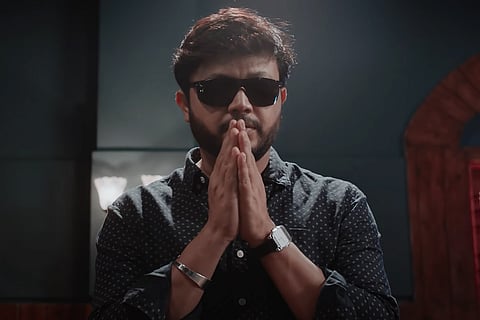

The only joke in Sakkath, directed by Simple Suni, writes itself in your head. A witness, who is a vegetable seller, tells the court that he went to buy onions because tomato prices had crashed. Half a kilo of tomatoes worth Rs 70 was lying in my refrigerator back home, and I burst out laughing.
That was the only time I laughed or even smiled, trust me, during the entire duration of a film that does not know what genre it belongs to. Is it comedy? Is it a love story? Or a stalker’s story? Or a courtroom drama? Or an investigative tale? To ensure they are protected on all counts, the film begins with a voiceover from Ganesh, requesting people to not file any case against the film or the team that made it.
The story of the film can be compressed into three lines. An orchestra singer Balu (Ganesh doing Ganesh things) wants to enter a reality show because he likes the anchor Mayuri (Surbhi) a lot, and so pretends to be blind. Parallely, there’s a murder and Balu is the prime eye (or ear) witness. He’s introduced to Nakshatra (Nishvika, who is quite effective), a teacher at a school for children with disabilities, who likes him. Some scenes might remind you of a badly-remade Andhadhun, but even that is an insult to the original.
Throw in some Sadhu Kokila comedy, where he’s body shamed (predictably), some songs (‘Premakke Kannilla’ composed by Judah Sandhy is my pick), some Mungaru Male references and you have a film that needed more work even at the scripting stage. I’m not speaking much about the women, because they truly are one-note characters, rarely questioning anything, even when it sounds absolutely absurd to the ears. Like smelling a sari and knowing what colour it is!
When it was released a decade-and-a-half ago, Mungaru Male (2006) still charmed, thanks to its music and youthful leads. One of those youthful leads has since stepped into middle age and this ‘suddenly falling in love’ business does not cut much ice. The ‘deer caught in the headlights’ look is passé too. And please, drunken driving is not funny, even if it is to tell your crush something of zero importance. In between, there are extremely profound lines with zero impact.
The film begins with a sage (I’m presuming it's Veda Vyasa) sitting with Lord Ganesha (with a very cute swaying trunk, yes I noticed even that!) and speaking about a Balu on earth, who wants to be both SP Balu and Ilaiyaraaja. At some stage, the sage bursts into English: “The best is yet to come!” I believed him. I should not have.
The problem with watching well-staged movies is that they spoil you for life. Three weeks after the Tamil Jai Bhim, it is plain torture to watch a courtroom drama where the judge (Malavika Avinash) looks sternly at someone who laughs and says, “Go stand near the door”. Ma’am, this is a court or LKG classroom?
There are fleeting portions of irreverence that vanish before you can marvel at them. Balu is kissed on the cheeks by Mayuri on the court premises, and the scene cuts to something else, but not before Balu says, “We could have cut to a song!” We have all heard the word ‘puncture’ used with such impunity and zero sensitivity in recent times. This film plays into that stereotype — a Muslim character, who is a thug, fixes punctures for a living.
If Sakkath was a love story or any story, to work, it needed some bonds to be established. But, no. There’s not time for anything, because the film has to rush, because it has to make time for songs, some bad humour, some low-hanging laughs at the expense of reality shows, some fights (one of them with the goons is reasonably well-staged), and more. The makers of the film presumed the audience is too tired to care about anything. In one scene, Balu wants everyone in court to tie a cloth around their eyes so they can listen to just their immediate surroundings, and then to what he has to say. No one removes a handkerchief, no one uses a dupatta or any cloth. No Sir, no. Everyone has a black cloth, cut to the same length and size in their hands. How ya, how?
The film is not without potential — it might have worked had they stuck to the story of a man pretending to be blind for one reason, and forced to carry on the charade, and the humour that it entails. But, that is never explored. You might wonder why ask so many questions of a film that does not respect itself or take itself seriously? Fair point. But, what else to do? One keeps asking, hoping it will reach their ears and they might focus on the story.
The best part of the film, and its most poignant, is the title credits — with Puneeth Rajkumar lording over the screen. It’s bittersweet, and reminds you why you’ll never get over some deaths.
Disclaimer: This review was not paid for or commissioned by anyone associated with the series/film. TNM Editorial is independent of any business relationship the organisation may have with producers or any other members of its cast or crew.